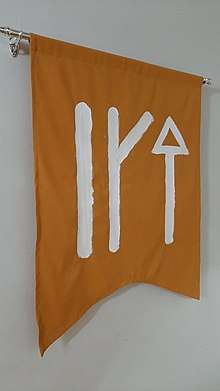Bayat (tribe)
The Bayat tribe (Azerbaijani: Bayat tayfası, Turkish: Bayat boyu, Turkmen: Baýat taýpasy, Persian: بیات) is one of the Oghuz tribes in Turkmenistan, Iran, Turkey, Azerbaijan, Iraq, Afghanistan, and Syria.[2] When Oghuz Turks started to migrate from the Aral steppes to Khorasan in the 11th and 13th centuries, Bayat people spread throughout the region.[2][3] They are sub-ethnic groups of Turkmens, Turkish and Azerbaijanis.[4] Bayats are Muslim and speak a southern dialect of Azerbaijani language in Azerbaijan and Iran, or their own dialect of Turkish in Turkey[5], and Ersari dialect of Turkmen in Turkmenistan and Uzbekistan.
Bayat | |
|---|---|
 Tamgha of Bayats, which represents Eurasian Eagle-owl according Mahmud al-Kashgari. According Abu al-Ghazi Bahadur, the Tamgha respresents Snowy Owl[1] | |
| Regions with significant populations | |
| Iran, Azerbaijan, Afghanistan, Iraq, Turkey, Turkmenistan, Syria, etc. | |
| Languages | |
| Azerbaijani, Turkish, Turkmen and Persian | |
| Religion | |
| Islam | |
| Related ethnic groups | |
| Oghuz Turks |
Etymology and origin
Initially, the ethnonym Bayat was mentioned as an Oguz tribe in the 11th century by the Turkic historian Mahmud Kashgari.[6] Bayat - an Oghuz Turkic tribe, who stood together with the Kayi tribe at the head of all 24 Oguz tribes - "Il bashi Kayi-Bayat."
In the traditions of the Turkic tribes, the origin of this tribe is traced to Bayat - the grandson of Oghuz-Khan. In the book of the Khan and historian of the Khiva Khanate, Abu al-Ghazi Bahadur, “Genealogy of the Turkmens,” the meaning of the name of the tribe is given as “rich”. Bayat was the second son of Gun-Khan, who was the first son of Oguz-Khan.[7] According to the work of the historian, Rashid-al-Din Fazl-Allah, “Oghuz-nameh”, which is part of his extensive historical work Jami' al-tawarikh (Collection of Chronicles), the name Bayat means “rich, full of grace”.[8]
Clans
Bayat is the name of an originally Turkic clan in Turkey, Azerbaijan and Iran which traces its origin to the 12th century. When Bayat clan started to migrate from the Aral steppes, their first destination was the city of Nishapur in the south of Khorasan, a state in the north-east of Iran. The Bayat clan moved in the 13th century to three different locations after attacks by Mongol forces.
The Bayat clan made war with the Mongols, killing Genghis Khan's son-in-law with his army. Then Khan attacked Nishapur with all his forces, killing many Bayat clansmen, and the rest of the Bayat clan escaped to the mountains around Nishapur.
From there, one group went east and north-east, so that the surname Bayat is still found in Afghanistan.[9] They moved further south and settled in the Gujarat Province, India. Bayat families are found in Surat, India and surrounding areas including Vorwad, Navsari, India. During the British Raj of India, many prominent businessmen and Islamic Scholars left India and took the opportunity to settle in the Natal and Transvaal Provinces of South Africa.

A second group went south-west towards Isfahan, and the surname Bayat is prominent in Arak, Hamedan, Malayer, Isfahan, Zanjan and Shiraz. The third group went north-west, and in Azerbaijan they divided in two; one part of the group took the west to Anatolia, and second part went south into Iraq, Syria and Lebanon
Bayat in Turkmenistan and Uzbekistan
Until 1928, the Gyzyletrek settlement of the Balkan velayat of Turkmensitan was called Bayathaji, while Bayat Turkmens still live in Darganata, Danew, Turkmenabat, Sayat, Farap and Hojambaz etraps of the Lebap velayat of Turkmenistan. Representatives of the Bayat tribe may also be found in many districts of Bukhara province of Uzbekistan, especially in Olat and Qarako'l.
Places with name Bayat
Bayats are spread far into western Anatolia, their principal areas of settlement being in the provinces of Konya, Bursa, Afyon, Balıkesir and Kütahya. Today the name in forms such as Bayat, Bayatlar, Bayatlı is found in thirty-two mainly western Anatolian toponyms. The name also appears in toponyms in Iran, two near Arāk, one near Zanjan, one near Urmia, one in Khuzestan, one near Borūjerd, and one in Khorasan. In post-Soviet countries, five places in Azerbaijan, four in Turkmenistan, and one in Uzbekistan close to the Turkmenistan border bear the names Bayat.[10] In Gujarat, India, one place can be found about 250km away from the India-Pakistan border.
List of places bearing the name Bayat
India
- Bayat, Gujarat Province
Iran
Turkey
- Bayat, Afyonkarahisar Province
- Bayat, Çorum Province
- tr:Bayat, Amasya, Amasya Province
- tr:Bayat, Merzifon, Amasya Province
- tr:Bayat, Ayaş, Ankara Province
- tr:Bayat, Korkuteli, Antalya Province
- tr:Bayat, Altıeylül, Balikesir Province
- tr:Bayat, Gölpazarı,Bilecik Province
- tr:Bayat, Kargı, Çorum Province
- tr:Bayat, Çivril, Denizli Province
- tr:Bayat, Çermik, Diyarbakir Province
- Bayat, Atabey, Isparta Province
- tr:Bayat, Tosya, Kastamonu Province
- Bayat, Beyşehir, Konya Province
- Bayat, Meram, Konya Province
- Bayat, Aslanapa, Kütahya Province
- tr:Bayat, Kütahya, Kütahya Province
- tr:Bayat, Gördes, Manisa Province
- tr:Bayat, Soma, Manisa Province
- Bayat, Bor, Nigde Province
- tr:Bayat, Geyve, Sakarya Province
- tr:Bayat, Durağan, Sinop Province
- Bayat, Sivas, Sivas Province
- tr:Bayat, Yıldızeli, Sivas Province
- tr:Bayat, Ereğli, Zonguldak Province
Notable figures from this clan include
- Dede Korkut, legendary figure of the Oghuz
- Fuzûlî, Azerbaijani Diwan poet of Ottoman era
- Yusuf Ali Shah, b. Navsari, India d. Durban, South Africa, mureed of Hazrath Shah Goolam Muhammad Soofie Saheb
People with the name Bayat
Bayat is a common surname today in Iran, Azerbaijan and to a lesser extent in Turkey, Afghanistan, and Turkmenistan where it carries the meaning "Knight" or "Chevalier". The Bayat surname can be found in the United Kingdom, India and South Africa.
Notable people with this name include:
- Abbas Bayat (born 1947), Iranian businessman
- Amod Bayat, (b. Surat, India 1859 d. Pietermaritzburg, South Africa 1939) South African businessman, Founder member of the Natal Indian Congress (N.I.C) and the Surat Sunni Musjid and Madressa in Pietermaritzburg
- Asef Bayat, Iranian professor of sociology
- Ehsan Bayat, Afghan-American entrepreneur, owner of Ariana Television Network and founder of the Bayat Foundation[11]
- Ismail Ebrahim Bayat, (b. Surat, India 1871 d. Durban, South Africa 1932) South African businessman and prominent muslim figure.
- Morteza Gholi Bayat (1890–1958), former Prime Minister of Iran
References
- A HISTORICAL AND SEMANTICAL STUDY OF TURKMENS AND TURKMEN TRIBES, Bilkent University
- Encyclopaedia Iranica. Bayat.: Bayāt was one of the twenty-two Oghuz tribes listed in Maḥmūd Kāšḡarī’s»
- R. Khanam. Encyclopaedic ethnography of Middle-East and Central Asia: J-O, том 2. Стр. 126—127
- Российский этнографический музей. Глоссарий. Баяты
- Languages of Iran
- Divanü Lûgat-it-Türk ve Tercümesi (in Turkish), translated by. B. Atalay. Ankara: Türk Tarih Kurumu Basimevi, 1985. Vol. I. p. 56; Vol. III. p.171
- Abu al Ghazi (1958). "Genealogy of the Turkmens". M. Nauka.
- Fazl-Allah (1987). "Oghuznameh (In Russian)". Baku.
- "BAYĀT – Encyclopaedia Iranica".
- The Bayat Foundation - Making a Difference in Afghanistan. October 18, 2006. WorldPress.org.